- Home
- Jonathan Stroud
The Empty Grave Page 22
The Empty Grave Read online
Page 22
There was another silence. We didn’t know quite how to respond to that.
“What about George, here?” Kipps persisted. “He’s practically dead already. How would he survive going through?”
“We wouldn’t be over there for very long. Besides, think about those old folks at the Orpheus Society. They clearly do it all the time, and it hasn’t killed them yet.”
“They had a lot of extra equipment,” I put in. “Those weird weapons, for a start. You can bet they’re all designed to keep spirits at bay.”
“And those crazy mechanical stilts,” Kipps said. “We haven’t got any of them.”
“Who needs mechanical stilts?” Lockwood rolled his eyes. “Or those stupid weapons? We’d only be popping over for a few minutes! Take it from me, one look at the gate and Winkman’s men would run a mile. And it is possible to build one—don’t you think so, George?”
George had been busily working his way through the second layer of chocolates, listening intently but keeping his own counsel, with Flo sitting at his side. Whether it was his quiet air, or his poor bruised face that did it, he carried a certain authority. We all looked at him as he toyed with a walnut whip and placed it carefully back in the box. “We can certainly try making one,” he said. “We can make the circle, put the Sources in it, do all that before sundown. I don’t see what we’ve got to lose.” He adjusted his broken spectacles. “Personally, I’d love to do it. I’d love a chance to glimpse the Other Side.”
“That’s the spirit,” Lockwood said. “Well done, George.”
“There’s also the incentive of staying alive,” George went on haltingly, “so that we can bring Marissa and her friends to justice. It may interest you to know,” he said, “that overnight I’ve read Occult Theories, that little book you so kindly brought back from the Orpheus Society. It wasn’t a wasted journey, you’ll be pleased to hear. I’ll tell you why, if someone puts the kettle on.”
Someone did. Flo offered around the remaining chocolates. Everyone politely refused.
“The book’s definitely by Marissa,” George said. “No question about it. I recognize her style from the Memoirs and other writings. But it’s a strange piece of work. She must have written it when she was very young, because there’s nothing about her being an agent, or psychic detection, or anything practical. It’s all much more airy-fairy than that, full of weird theories about life and death. The thing that really jumps out is her obsession with the stuff that spirits are made of. She thinks ghosts are proof that this substance is immortal. The body falls away, and the spirit continues on.”
“We’re back to ectoplasm, then,” Holly said.
“Yes,” George said, “though she calls it by other fancy names, too: ‘the soul,’ ‘eternal essence,’ stuff like that. And she doesn’t see it as dangerous, like it is when a ghost touches you over here. She thinks that on the Other Side it gets much purer. She reckons that if you could get hold of it somehow, if you could capture it and absorb it, it would rejuvenate your body and make it young again.”
“Which is exactly what’s happened!” I said. “The woman we call Penelope is really Marissa—only young again! That would explain what the skull’s been telling us.”
“Absorb it?” Kipps echoed. “How would that work? What, does she bathe in it or something? Does she eat it? What?”
George shook his head. “In the book, she waffles on about an ‘elixir of youth,’ but I don’t think she really knew at that point. It’s all theory. Clearly she’s got it figured out now, though. She and her pals must use a spirit gate to go over to the Other Side and collect the plasm. But there’s one other thing I noticed….I had to scribble the passage down, it was so good. It’s stuffed down the back pocket of my pajama bottoms, if you could just reach it for me, Lockwood. My arms are too stiff.”
“Must I? Oh, God, all right—there you go.”
“Thanks.” George took the crumpled piece of paper. “Remember how we were guessing that Marissa had a pet Type Three of her own to help her? Well, she does. Listen to this quote. It’s a beauty: ‘Such matters are beyond the wit of man or woman, and we must turn to the spirits themselves to help us. One such, fair of form and wise of countenance, comes regularly to me. I have spoken with him since I was a child. Dear Ezekiel is learned in matters of life and death, he understands buried secrets and the minds of mortals. With his help, we can transcend our baser natures, and make ourselves pure.’” George put the paper down with an air of finality. “Couldn’t be much clearer, could it? She’s had a spirit advisor, all along.”
“This Ezekiel sounds a tad more informative than your tatty old skull, Luce,” Lockwood commented. “Thanks, George.” He sat back and considered us, his team and his associates, all sitting silently around the table. “Well, here’s the situation as I see it,” he said at last. “If we could get into the inner regions of Fittes House, we’d no doubt find ample proof of everything George has discovered. We’d find evidence of Marissa’s crimes. We’d find the gate she’s using to get to the Other Side, too. But we can’t get in. The place is too well guarded. Barnes might do it, but there’s no way he’d risk a confrontation with Marissa. I went to ask him yesterday, and he again said no.” Lockwood shook his head. “The upshot is: we’re on our own right now, with Winkman and his men likely to pay us a visit very soon. So I suppose I should say at this point that anyone who wants to leave is free to go. Me, I’m staying at Portland Row. It’s my home, and I’m not abandoning it for anyone. But you—”
“Shut up, Lockwood,” Holly said. “None of us are turning tail at this point.”
Kipps grunted. “No matter how crazy your plans.”
Lockwood’s grin was wide, infectious. “All right,” he said. “In that case, the question I’d ask you is a very simple one.” He looked at us. “What are we prepared to do to win?”
An hour later, Holly, and I were sitting with Lockwood outside his sister’s bedroom. The door was wide open, and cold emanations from the death-glow above the bed pulsed across the landing. We had emptied the final shipping crate and, amid a sea of scattered wood shavings, were unwrapping the objects it contained. There were wooden masks, carved sticks, brightly colored pottery jars sealed with wax, and opaque glass bottles. Anything that had the remotest psychic potential we piled in one corner; the rest we cast aside. It was the same procedure we’d used when emptying the other crates, only now carried out in double-quick time.
The skull in the jar was with us, too. It was still in a bad mood after our argument the night before. So was I, for that matter. Everything was pretty much as usual, then.
“Don’t tell me,” it said. “Another crisis. Or is sitting knee-deep in haunted objects the latest craze for all idiot agents? What are you going to do, play Hot Potato now? ‘When the music stops, the Source explodes and a ghost will eat your face.’ I can’t really see it catching on.”
“If you could try to be helpful for a moment,” I growled, “we’re separating out all the strongest Sources. Some we’re sure of, but others we’re not.” I pointed to our “of interest” pile. “What do you think of these?”
The ghost sniffed dubiously. “Some are psychically dangerous,” it said, “but you’ve got a lot of junk there, too. Particularly that pierced gourd Holly Munro is putting her head in—but that’s an issue of hygiene more than anything.”
“That pointy one? I thought it was a shaman’s mask.”
“It’s worn in tribal rituals, yeah. But those guys didn’t put it on their faces, I’ll tell you that.”
“Er, Holly…”
Her voice was muffled from inside the gourd. “What?”
“Oh, nothing. I like the mask! You look good. Keep it on!” I turned back to the skull. “Exact function aside, you’re saying it’s useless?”
“There’s no trapped spirit in there. Those sealed pots, though—they’re more interesting. They’ve got the whiff of the grave about them. And that dream catcher with the bamboo handle, too…�
� The face in the jar grinned evilly. “Why not break them all and see what’s inside?”
“Not until we’re ready.” I looked into Jessica’s room, at the black plasm burn that had eaten away the center of the abandoned bed. That had been caused by a ghost unleashed at the wrong moment. Lockwood had his back to the bed; he was calmly unwrapping another bundle from the crate. He still radiated the implacable determination that carried everyone along with it, the fierce serenity that he’d had all day.
The morning went on. We emptied out the crate and cleared the mess away. A great pile of Sources lay in the abandoned bedroom. Holly and I began to go around the house, taking the ornaments off the walls, stripping the shelves of all the psychic curios brought back by Celia and Donald Lockwood so long ago. All this was taken to the landing. Without the decorations, the hall and living room had that odd, cold, slightly echoing quality you usually get in a haunted, empty house. It was dark, too: Kipps had been working on the barricades, and most of the windows were covered. Thirty-five Portland Row no longer looked itself. It made us all feel sad.
Toward lunchtime, Flo Bones left us. She had offered to stay and help, but it was clear that she found it uncomfortable remaining so long with a roof over her head. I guessed the possibility of an impending attack might have influenced her, too. Before her departure, however, Lockwood took her to the library. They spoke for a long time, alone. Then Flo slipped away, leaving only a few dirty footprints to remember her by.
Midday passed; the sun reached its zenith and began to decline toward the west. Shadows slowly lengthened in Portland Row.
We began to build the iron circle that would surround our spirit gate. George was in charge of this. An easy chair had been brought up from the library and positioned on the landing. From here, surrounded by crumb-strewn plates, he supervised our efforts as we brought great coils of iron chains up from the basement. The Mullet’s van had delivered most of these the previous day; now we wound them over each other to form a single iron barrier—a hoop or circle of enormous thickness—that went right around the outside of the old bed and sealed its death-glow within.
It wasn’t pleasant work, exactly. The bedroom was a difficult place to spend time in. Cold energy pulsed from the death-glow, freezing your skin and setting your teeth on edge. But it had to be done. We cleared everything inessential out of the room to make space for the circle. Lockwood emptied out the chest of drawers at the back, throwing its contents—old photographs, boxes of forgotten jewelry—into plastic bags and taking them away. Meanwhile, under George’s blackened but watchful eye, Kipps started constructing the trickiest part of the gate: the single chain that would provide our entry path, cutting across the circle from our world to the next.
“We need two metal posts,” George said, “hammered into the floor on either side of the circle. Then we suspend a thick iron chain between them so that it runs right over the top of the bed. It mustn’t touch the bed, or the death-glow. It’s got to be hanging in midair, so that we can hold on to it. The iron in the chain will keep the spirits at bay, give us a safe route when we go through the gate.”
“If we go through,” Kipps said. “I’m devoutly hoping we won’t have to. Uh-oh—” He broke off as Lockwood and I arrived on the landing. “I don’t like the look of these.”
We were carrying the spirit-capes. We had our original feathered cloak, as beautiful and iridescent as ever, which had already proved itself on the Other Side. We had a second feathered one, too, this of resplendent pink and orange plumage, and a third cape, covered with patchy fur. All these came from Lockwood’s parents’ crates. From the storeroom of the Orpheus Society, we had two modern silver capes as well.
“I’m going to allocate cloaks now,” Lockwood said. “There may not be time later. Lucy, I want you to have our faithful old spirit-cape. Kipps, you take this other feathered one. Holly, this one with the furs is about your size. George and I will wear the Orpheus outfits. We stole enough Orpheus gloves to go around, too. Let’s check that they fit. Everyone try them on.”
I already knew the feel of my spirit-cape—its warmth and lightness, the soft protection of its plumage—and I had it on in no time. The others were more hesitant. George was stiff and needed help getting his on. He and Lockwood both shimmered with silver; their scaly cloaks had a smooth, reptilian feel. Meanwhile, Kipps’s eyes boggled at the multicolored splendor of his feathered ensemble, while Holly cringed at the texture of her pelts.
In its jar the skull cackled long and loud. “This is like feeding time at the world’s worst zoo,” it said. “I feel like throwing you all some sardines.”
“Just how many dead animals am I wearing here?” Holly muttered. “I look like a fur trapper. This is awful.”
“And I look like a stuffed parrot,” Kipps said. “Trust you to give me this.”
“I think you look adorable, Quill,” George said. “Very colorful. Those pink feathers in particular are lovely. And see how long it is. That’ll give you ultimate protection on the Other Side.”
“You make it sound like a deodorant. If any of my friends see this…”
“Friends, Kipps?” George gave him a slow and painful wink.
Kipps snorted. “Yeah, well, if I had any before, I certainly won’t now.” He removed the cloak and went off grimly to hammer a post into the floor.
It was late afternoon. Half of Portland Row was in deep blue shadow. You could taste the onset of evening. Lockwood sent Kipps upstairs to the undefended window of my attic so he could watch the road.
In Jessica’s room, everything was in place: the iron circle, the guide-chain running between the posts. It was time to put the Sources in the circle and create the gate. Lockwood and I did this, swiftly and alone. Each object had to be opened—wax seals cut, pouches slit, wooden surfaces pierced—to allow the escape of the spirit within. Anything that contained a Source was broken in this way, and placed inside the ring of iron. It was still daylight, so the work was theoretically safe. Even so, we didn’t dawdle. Jars, bottles, masks, and dream catchers—everything was opened and put in.
As we worked, it was possible to feel a slow buildup of psychic pressure in the bedroom. There was already plenty from the death-glow, hanging like a faint oval above the bed, not far from where the guide-chain ran; but now, steadily, an accompanying buzz or hum began to join it, the psychic vibrations from the bones and other haunted fragments littering the floor. The air within the circle began to grow thick and strange; Lockwood and I moved ever faster, watching the window and the dying of the light.
“Think this’ll be enough?” With a small hammer, I knocked a hole in one of the final clay pots, revealing a couple of knuckle bones. My fingers tingled as I touched them. I threw them quickly into the circle.
Lockwood’s face was set; he snapped the wax seal off the end of a bamboo stick and poured several yellowed teeth beyond the chain. “Can’t you feel it? It’s not even dark yet, and the light in the circle’s becoming hazy. It was the same with the Rotwell gate, remember? You couldn’t see the far end of the cross-chain. Give it a couple of hours and there’ll be a way through—if we need to take it.”
“Lockwood,” I said, “do you think we will?”
He only looked at me. We finished our work and left the bedroom. We could feel the throb and pulse of the widening gate even as we went downstairs.
For some reason that none of us expressed but all agreed on, we felt the need for a good supper that evening at Portland Row. Ignoring the boarded-up windows, ignoring the piles of weapons lying around; above all, ignoring the psychic thrum from the room upstairs, we went about the business quietly together, everyone pitching in. Holly made a salad; Lockwood cooked bacon, egg, and sausages; Kipps and I cut the bread and set the table. We ate it quickly, taking turns to go to my attic room to watch the street. Then we washed up (again, it was somehow important to do so), and put everything away. The sun was almost down. We wandered about the house, each lost in his or her own thoughts. We
’d done all that we could do.
I unbolted the kitchen door and, avoiding the trip wire that Lockwood had placed on the steps, went down into the garden. I’d been inside all day; I badly needed to be out. As always, it was a mess. We never had time to mow the lawn, so the grass was nearly knee-high. There were apples on the tree that needed to be picked; windfalls were already littering the soil below. I stood looking at the houses beyond the garden wall, where other people lived their separate lives.
“Getting some air, Luce?”
I turned, and it was Lockwood. He hopped down the steps and came toward me across the grass, dark and thin and lit to shining by the dying sun. It was like he was going to ignite. Quite unexpectedly, the sight made me want to cry. All my fears for him, and for all of us, suddenly hit me as if from nowhere.
“Hi,” I said. “Yes, just getting some air.”
He considered me, his eyes soft and serious. “You’re upset.”
“It’s been a long day….” I brushed my hair out of my face, looked away from him, and cursed softly. “Who am I kidding? I’m frightened, Lockwood. It’s like you said the other night. This might be the end.”
“No. It’ll be all right. It will be all right, Lucy. You have to trust me.”
“I do. Sort of.”
He grinned. “That’s nice to hear.”
“I trust your Talent and your leadership,” I said. “It’s the way you seem to be enjoying this that I can’t quite understand.”
He came to stand beside me. The sunlight was still on him. Right then, he was close to the idea I’d always had of him; the picture I saw in my mind’s eye when drawing near to sleep. If the skull had been there to see us, he’d no doubt have snorted long and loud. But the skull wasn’t there.

 The Leap
The Leap Buried Fire
Buried Fire Heroes of the Valley
Heroes of the Valley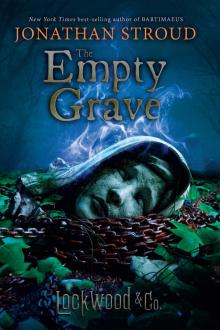 The Empty Grave
The Empty Grave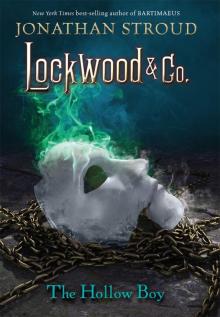 The Hollow Boy
The Hollow Boy The Last Siege
The Last Siege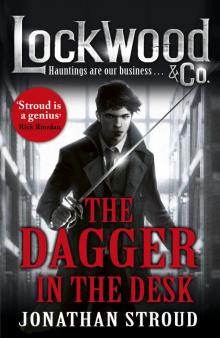 The Dagger in the Desk
The Dagger in the Desk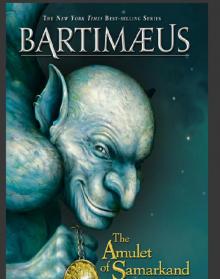 The Amulet of Samarkand
The Amulet of Samarkand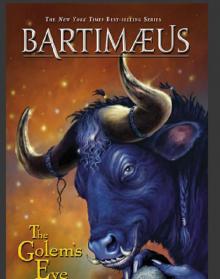 The Golem's Eye
The Golem's Eye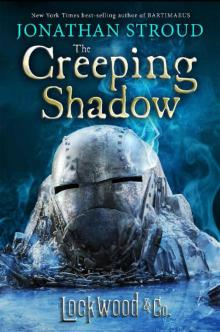 The Screaming Staircase
The Screaming Staircase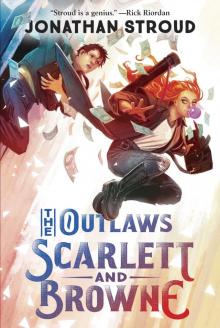 The Outlaws Scarlett and Browne
The Outlaws Scarlett and Browne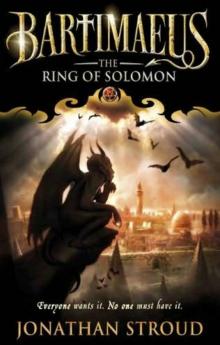 The Ring of Solomon: A Bartimaeus Novel
The Ring of Solomon: A Bartimaeus Novel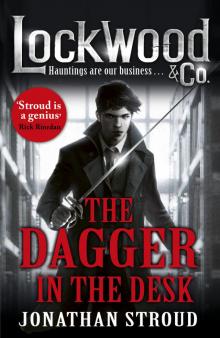 Lockwood & Co
Lockwood & Co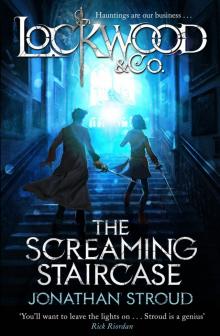 Lockwood & Co: The Screaming Staircase
Lockwood & Co: The Screaming Staircase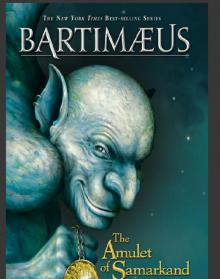 Bartimaeus: The Amulet of Samarkand
Bartimaeus: The Amulet of Samarkand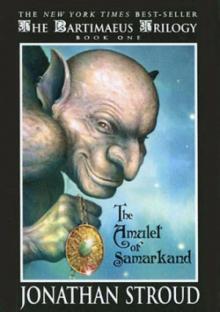 The Amulet of Samarkand tbt-1
The Amulet of Samarkand tbt-1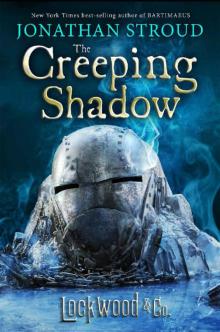 Lockwood & Co.: The Creeping Shadow
Lockwood & Co.: The Creeping Shadow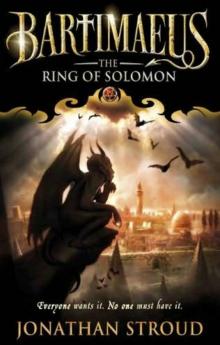 The Ring of Solomon
The Ring of Solomon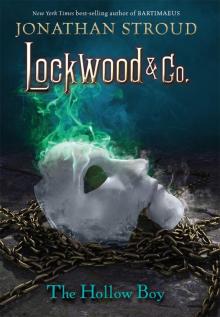 Lockwood & Co. Book Three: The Hollow Boy
Lockwood & Co. Book Three: The Hollow Boy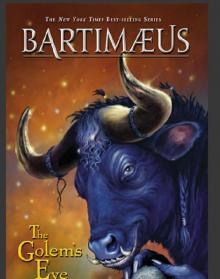 Bartimaeus: The Golem’s Eye
Bartimaeus: The Golem’s Eye